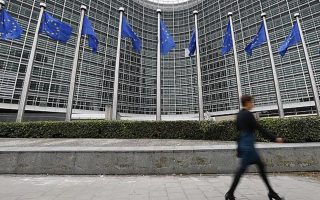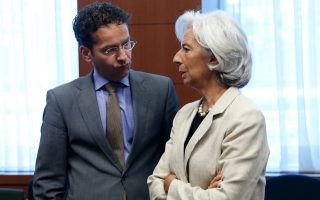Eurogroup paves way for aid, cheap ECB borrowing

Greece on Thursday secured the release of 7.5 billion euros in bailout loans, paving the way for the disbursement of the funds next week and the restoration of a waiver to the rule preventing Greek banks from tapping cheap liquidity from the European Central Bank.
Eurozone finance ministers approved the release of the funding following talks in Luxembourg, deeming that Greece had fulfilled its pledges for economic reform.
“This is a welcome breath of oxygen for the Greek economy,” European Economic and Monetary Affairs Commissioner Pierre Moscovici told reporters after the meeting.
The cash is to be disbursed early next week, well in time for Athens to meet debt repayments to the ECB and the International Monetary Fund in July. Of the 7.5-billion-euro tranche, 1.8 billion euros is to go toward paying off some of the state’s debts to suppliers.
Next Wednesday will bring the restoration of a waiver on a rule preventing Greek banks from tapping cheap financing from the ECB. From then onward, the ECB will be able to accept Greek government debt as collateral for central bank cash.
In comments after the meeting, Tsakalotos said the focus would now shift toward growth over the coming year. But he underlined that authorities were aiming for a new kind of growth with an emphasis on respect for workers, fair wealth distribution, and respect for the environment.
Back in Athens, Prime Minister Alexis Tsipras also sounded an optimistic note, saying that most of the fiscal adjustment demands had been met, allowing the country to turn a page and pursue policies of economic growth.
“A cycle is ending for the country,” he told a conference at the Acropolis Museum on Thursday, referring to the recent deal with international creditors, which, he said, aims at fiscal stability and the restoration of funding to the banking sector and the beginning of debt relief talks.
It’s the first time in six years, he said, that the country is entering “a stable macroeconomic, fiscal and investment environment.”
He went on to contrast the government’s policy of “just growth” with that of previous governments. “[Previous governments] consider the ruins they left behind as advantages for the economy.”
But the government’s outward appearance of optimism is being dampened by dissent from within the ruling leftist party, such as the Group of 53, which has come out against the changes the government wants to make to the electoral law and changes in the way the president of the country is elected – as part of the planned review of the Constitution.
Leading party officials speculate that the group made its dissent public with an eye on the party convention in the fall, where it aims to fill the gap left by the creation of the Popular Unity splinter party, which rallied against the party’s “betrayal” of its fundamental tenets and pre-election campaign pledges.





